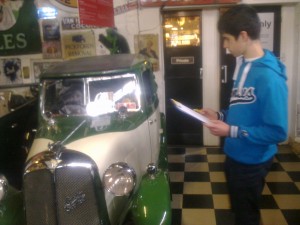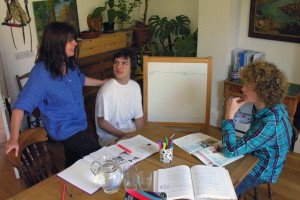 Being my students’ ‘English Mum’ is as big a part of the job as being their teacher. I make every effort to ensure that my students feel happy and comfortable in my home; for example, by shopping and planning meals with them.
Being my students’ ‘English Mum’ is as big a part of the job as being their teacher. I make every effort to ensure that my students feel happy and comfortable in my home; for example, by shopping and planning meals with them.
I try to find out as much as I can about their interests, and plan trips and activities that they will enjoy. I respect the fact that most of my students come to me during their school holidays, and I try to make their stay feel like a holiday, even though they are learning English.
I want my students to have a good time, a good experience of England and our culture, and happy memories to take home. These things influence the student’s attitude to learning English. Even students who don’t like learning English at school, can become happy and motivated after a really good experience here.
A New Experience
Most of my students have never before had a teacher who:
- plans the whole course with the student
- chooses subject matter according to each student’s interests
- works at the student’s pace
- focuses patiently on the areas the student finds difficult
Many students discover that they enjoy learning English!
Different from School!
- Lessons take place in my sunny dining room.
- Sometimes we work in the garden, or in a café, a museum, or the streets.
- Snacks and drinks, pyjamas and animals are permitted in the classroom.
- We have a break or change the activity when the student is saturated;
not when the bell rings.
The Tuition
 My goal is to give each student as much ‘English talking time’ as possible, during and outside class time. It is speaking English that fixes the language in the memory. Younger learners generally have a shorter attention span than adults. It is important therefore to change activities frequently. I use highly respected course books to give structure to the course, but also games and puzzles, chants and songs, projects and practical activities. Each student is given a students’ workbook, related to the course book, which is used for afternoon ‘homework’, and is theirs to take home,at the end of the course.
My goal is to give each student as much ‘English talking time’ as possible, during and outside class time. It is speaking English that fixes the language in the memory. Younger learners generally have a shorter attention span than adults. It is important therefore to change activities frequently. I use highly respected course books to give structure to the course, but also games and puzzles, chants and songs, projects and practical activities. Each student is given a students’ workbook, related to the course book, which is used for afternoon ‘homework’, and is theirs to take home,at the end of the course.
A typical project would be to write a questionnaire about British culture or local information, and then take the student out to speak to local people. This type of work builds confidence in speaking English to strangers, and it’s much more fun than sitting in a classroom!
I offer exam coaching for older teenagers. I have plenty of exam preparation materials and students are welcome to bring their own books and papers for us to work with.
Home activities sometimes include crafts such as felting and jewellery making, baking cakes and biscuits, or teaching me a favourite family recipe. Working together in this way is a great way to get students talking, without feeling pressure, and the language is real.




